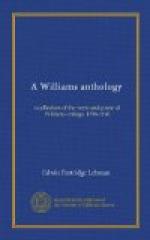But though the majority of us have become chary of the muse, there are some who have never seen through her trickery. To this unfortunate class belonged a certain Mrs. Simons—her real name is charitably withheld—who found that she could gratify a moody disposition, of which she was the unhappy possessor, by writing verses. No one appreciated them, but, far from dampening her enthusiasm, it afforded her a sort of bitter joy, that considerably increased her already large number of available themes. Her poems now proclaimed that she, Mrs. Simons, was singing to stocks and stones; no one would listen, and her tender nature would soon succumb to this unwarranted neglect. But triumph would come, when, as a cold corpse, she would lie in an open grave, with all her formerly unsympathetic friends and relatives weeping and wringing their hands at the sad spectacle. Alas, their grief and contriteness of heart would be too late. The little word which might have saved her from this early death, now spoken, would fall on deaf ears. At last her verses would be read and their gloomy prophecy would fill the world, ever afterwards, with remorse. But Mrs. Simons did not wilt away and die like a flower deprived of water and sunshine. She could not overcome her naturally sound constitution, and, in spite of her wishes to the contrary, she lived to a ripe old age.
Verse demands, as a rule, serious, if not exalted, themes. It is strange how ambitious they sometimes are. I knew a young man who had never been especially fond of poetry and had never attempted to write it, until, one day, he had an imperative desire to test his powers in that line. And what was the modest subject that the tyro chose? A history of the earth from its birth “amidst the crash of worlds,” through the countless centuries until, cold and dry, it affords no sustenance to life, and becomes a vast desert like the moon. The poem came to an abrupt end after “monsters huge” had appeared upon the scene, and, to my knowledge, was never resumed.
Among the many who have advertised their bigotry or their ignorance by publishing original compositions, for which it would be hard to find any suitable descriptive term, are two women, one of whom is well known. They are Julia A. Moore, self-styled “The Sweet Singer of Michigan,” whose works are included by Dr. Crothers in The Hundred Worst Books, and a Mrs. L., a native of Rhode Island, but “by adoption a westerner,” as she explains in her introduction. If it were a question of which had the less poetic merit it would be hard indeed to decide between them, but as to the sincerity of the one and the pomposity of the other, there can be no doubt. The Sweet Singer plays upon the strings of her own heart in a way that makes your eyes grow dim. She has moments of modesty, too, about her work that are very gratifying. But Mrs. L. is cold and egotistical; lifted so high above the ordinary plane of life, in her estimation, that no arrows of criticism can possibly reach her. The introduction to her book Mariamne, Queen of the Jews, and Other Poems, is concise and statistical. One can see that she has perfect self-confidence in her abilities.




